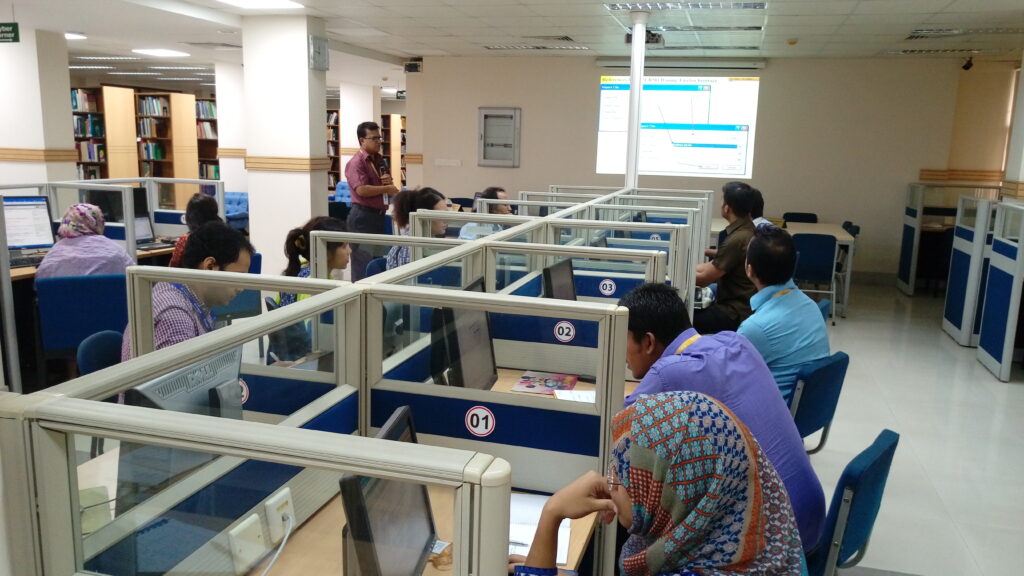Research4life in 2024- Celebrating impact and championing equity
As 2024 comes to an end, we reflect on an inspiring year guided by our vision to empower researchers, institutions, and communities worldwide with equitable access to the knowledge they need to drive sustainable progress.
In this Year in Review, you’ll find stories of resilience, collaboration, and shared commitment to advancing knowledge and addressing global challenges. Discover how Research4Life is fuelling innovation across fields like healthcare, agriculture, and education—from boosting food security in Ethiopia to supporting the development of cutting-edge medical libraries in Bangladesh.
This year has also been about amplifying the voices of researchers in low-resource settings, championing equity through advocating for inclusive research practices and uniting global publishers to reaffirm their commitment to research equity and the Sustainable Development Goals (SDGs).
We are particularly proud to have released our inaugural Impact Report, highlighting the strides we’ve made and our aspirations for the future. We invite you to join us in celebrating our achievements and support our mission to create a more inclusive, diverse, and equitable scholarly communications environment.
Reporting progress and impact

First ever Impact Report from Research4Life
We are pleased to announce the publication of our first ever Impact Report “Changing the face of global research”. Designed to show what we’ve achieved, and communicate our hopes for the future of our organization.

Research4Life Country Connectors Annual Report
Check out our Annual Report featuring stories from 11 countries about how our Country Connectors are implementing interventions to increase awareness and usage of Research4Life.

WIPO Study: Research4Life Program Spikes Research Output by up to 75%
A new study conducted by leading researchers from the World Intellectual Property Organization (WIPO), reveals that free or low-cost online access to scientific – as provided by Research4Life, result in surge in scientific output.
Supporting national priorities and local institutions

Bhutan Health Journal expands global reach with DOAJ Indexation and Research4Life impact
Explore how collaboration between local and international experts has fuelled this journal’s success and how it is shaping the understanding of Bhutan’s health research.

Smart medical libraries for a ‘Smart Bangladesh’, the contribution of Research4Life
M. A. Mamun and S. Rahman highlight how smart medical libraries, supported by Research4Life, drive healthcare modernization and advance ‘Smart Bangladesh’ and the SDGs.

How Hawassa University’s research is boosting food security and transforming agriculture
Hawassa University in Ethiopia uses Research4Life to advance agricultural research, fostering academic growth and sustainable development.
Empowering researchers

Hope amid huge budget cuts: Improving research in Malawi
Felix tells us that ‘on average, a single research paper costs around £30. For a postgraduate student requiring at least 100 papers, the cost would amount to £3,000—well above the tuition for a master’s degree’. He says, ‘Research4Life program has been a game-changer for Malawian researchers, providing access to an extensive range of academic resources’.

Research4Life Echoes – Olena Pozharytska
Olena Pozharytska, a linguistics professor at Odessa Mechnikov National University, Ukraine, shares how the Research4Life portal has transformed her research. Access to high quality research articles and databases has enhanced her work, leading to publications in top journals and recognition as ‘Best Young Scholar.’

Research4Life m’a ouvert au monde de la recherche
Récemment nommée Chevalier de l’Ordre des Palmes Académiques par le Ministère de l’Enseignement Supérieur, de la Recherche et de l’Innovation du Burkina Faso, Kambou Kadio Kabou n’est pas seulement une experte en sciences de l’information mais aussi une source d’inspiration.
Advocating for equity and inclusion in research

What does “decolonizing” research mean, and why is it important?
Find out the best practices for decolonising research and ensuring inclusive projects to achieve a more equitable distribution of knowledge.

In the pursuit of collectively attaining the SDGs, the concept of empowering researchers in low-resource settings stands as a critical imperative, necessitating the bridging of formidable gaps through inclusive strategies.

How can we help the growth of research from LMICs?
Progress in LMICs research output is uneven. Organizations can help increase participation of researchers from LMICs by reflecting and making change, for example through participatory and decolonizing research methods.
Declaring our commitment and rallying support

Research4Life unites partners for recommitment to research equity and SDGs
Research4Life united publishers to reaffirm their commitment to equitable research access and advancing the UN SDGs, bridging knowledge gaps globally.

Why are we fundraising for Research4Life?
We need help to support the critical mission of Research4Life to enable full participation in the global information environment.

Declaration on “Research4Life as an Enabler for the Future of Humanity”
We declare our steadfast commitment to advancing global access to academic and professional peer-reviewed information resources as a critical enabler for the future of humanity.





